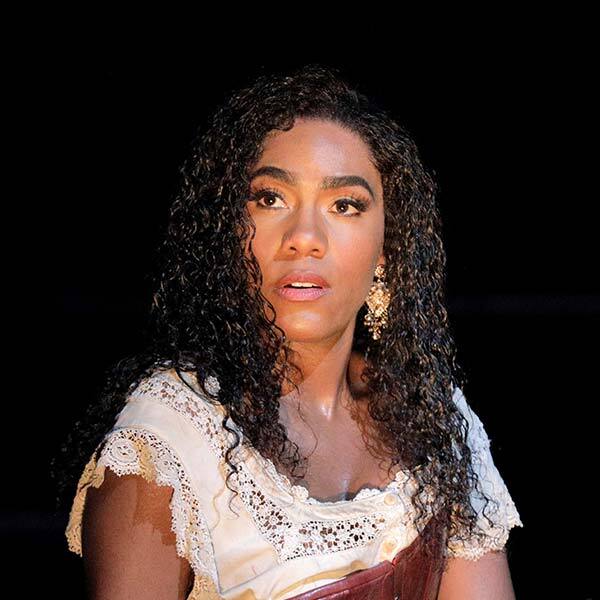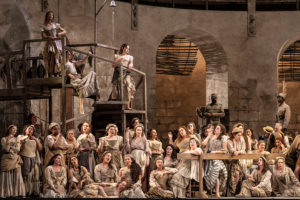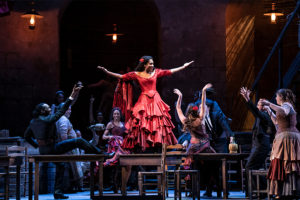
 [rating=5] Carmen has been one of the world’s most consistently popular plays for nearly one hundred and fifty years, featuring music by Georges Bizet that is instantly recognizable and being one of the first modern dramas to depict psychologically complex characters who are regular people. It’s also a play that has been subject to all sorts of interpretation, being heavy on themes of sexism and racism, and flexible enough in presentation to be sung-through or with spoken dialogue. The production now at the Lyric, directed by Marie Lambert-Le Bihan and conducted by Henrik Nánási, takes the version with spoken dialogue back to basics, focusing heavily on the character development of Carmen and Don José, played by the multitalented singing actors mezzo J’Nai Bridges and tenor Charles Castronovo, in a realistically designed set by Robin Don. The design is a choice that allows the power of the social drama to shine through at its most emotionally intimate, without any sacrifice of musical grandness.
[rating=5] Carmen has been one of the world’s most consistently popular plays for nearly one hundred and fifty years, featuring music by Georges Bizet that is instantly recognizable and being one of the first modern dramas to depict psychologically complex characters who are regular people. It’s also a play that has been subject to all sorts of interpretation, being heavy on themes of sexism and racism, and flexible enough in presentation to be sung-through or with spoken dialogue. The production now at the Lyric, directed by Marie Lambert-Le Bihan and conducted by Henrik Nánási, takes the version with spoken dialogue back to basics, focusing heavily on the character development of Carmen and Don José, played by the multitalented singing actors mezzo J’Nai Bridges and tenor Charles Castronovo, in a realistically designed set by Robin Don. The design is a choice that allows the power of the social drama to shine through at its most emotionally intimate, without any sacrifice of musical grandness.
The story is set in Seville, although it looks like it has been moved forward several decades from in the source material, to the late nineteenth century. Don José is a soldier and something of a burnout who is estranged from his ailing mother, who has sent good-girl Micaëla (soprano Golda Schultz) to woo him back to her side before she dies. But José is intrigued by the other soldiers’ description of Carmen, the most desirable woman in the cigarette factory they guard, and when she takes note of him on one of her breaks, he is instantly smitten. Shortly after, he helps her escape when she gets in trouble with the law, and she develops a relationship with him. But Carmen is ambivalent about dragging him down with her into a life of steadily more serious crimes and grim omens, which strikes at José’s long-standing insecurities.
It might seem obvious to say, but it’s critical to note that Carmen goes on a character arc over the course of the story; she does not start off as a bandit. She’s often been treated as a symbol or reductively described as a femme fatale, but Bridges’s version of her is striking in her normality. One gets that sense when she’s performing in her iconic opening Habanera that she didn’t just randomly happen to reveal her most vulnerable thoughts to a crowd of strangers, but that her claim to be averse to commitment for reasons she’s trying to spin positively is a performance for herself, as well. Later, she looks genuinely hurt when her smuggler buddies complain that her attempt to live in two worlds makes her unreliable to everybody, and that she has a small causative role in a series of events that result in her friends committing kidnapping and possibly murder while José is a witness is bad luck for both. As for Castronovo’s José, the tragic thing is that he didn’t seem like a bad person, just a bit easily led and prideful. His Flower Song, in which he describes his love for Carmen, is out of place stylistically and lyrically for these surroundings, and yet, it’s clear in this performance that is exactly what makes him attractive to her.
Bridges and Castronovo give outstanding performances, and that of Bridges is especially interesting to Lyric fans because she is a Ryan Center alumna, but this production has plenty of talent to share. Carmen is no monster, but she seems one to Micaëla, and Schultz’s third-act defiant aria is both stirringly powerful and heartbreakingly innocent. Baritone Andrei Kymach is all swaggering bravado as the bullfighter Escamillo, but he finds the subtle humor in the famous toreador song, as well as more slapstick humor when he invokes bullfighting tactics in his brawl with José. A lot of credit must also go to Fight Director Nick Sandys for helping the actors develop high stakes; these versions of Carmen and José are very human, and very dangerous. Robin Don’s set design makes the lived-in city of Seville an omnipresent character, capturing the heavy burden of history. (This is also a rare play in which children are visible, making it seem like a more complete world.) Nánási leads the orchestra in delivering everything you could want from Bizet’s beloved score, but always uses it to support the actors. This is a character-driven drama and one that shows that music on the largest scale can capture the lives of ordinary people.
 Carmen will continue at the Lyric Opera House, 20 N Upper Wacker Drive, Chicago, thru April 7, with the following showtimes:
Carmen will continue at the Lyric Opera House, 20 N Upper Wacker Drive, Chicago, thru April 7, with the following showtimes:
March 19 2:00 pm
March 22 7:00 pm
March 25 7:30 pm
March 30 2:00 pm
April 2 2:00 pm
April 7 7: 00 pm
Running time is three hours and twenty-five minutes with two intermissions.
Performances are in French with English supertitles.
Ticket prices vary. The Lyric offers parking deals with Poetry Garage at 201 W Madison St. if inquired about in advance. To order, visit LyricOpera.org or call 321-827-5600.
To see what others are saying, visit www.theatreinchicago.com, go to Review Round-Up and click “Carmen.”






More Stories
“The Firebugs” reviewed by Julia W. Rath
“The Book of Grace” Al Bresloff with another from Paul LIsnek
“The Last Five Years” MILWAUKEE